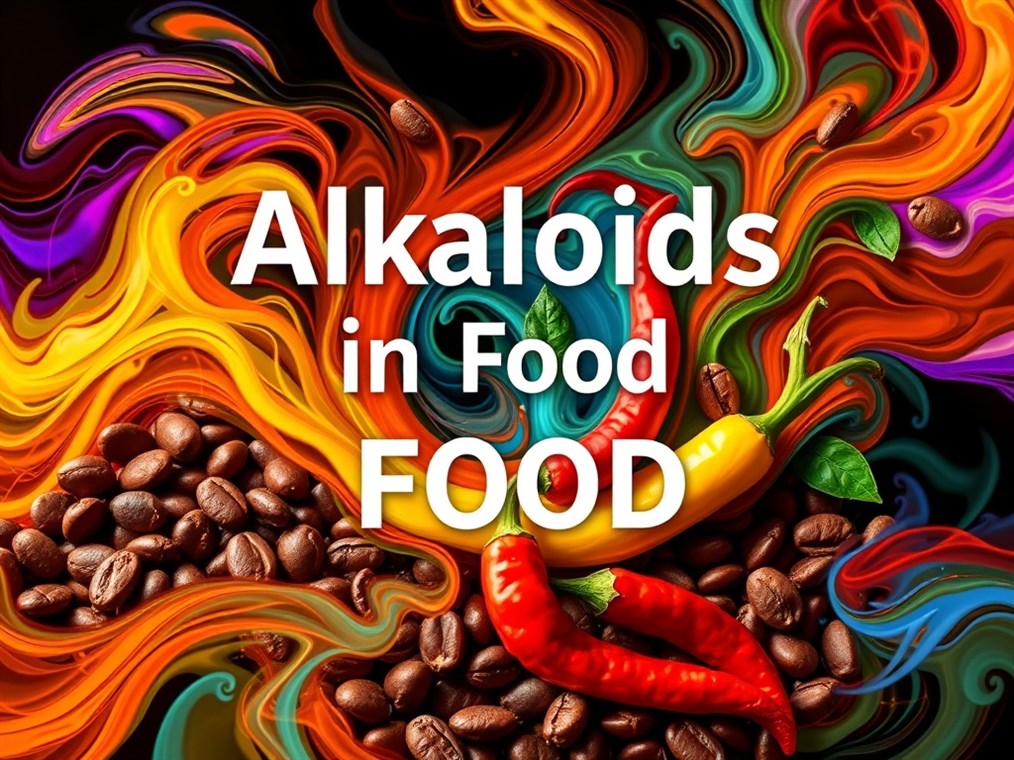Decoding Alkaloids: What Foods Really Contain These Potent Compounds?
Ever wonder what makes your coffee so darn addictive, or why that spicy pepper packs such a punch? The answer might lie in alkaloids – naturally occurring compounds found in a surprising number of foods we eat every day. These little guys, packed with nitrogen, can have a huge impact on our bodies, from giving us a caffeine buzz to, well, potentially causing some trouble if we’re not careful. Let’s dive in, shall we?
So, What Are Alkaloids, Anyway?
Think of alkaloids as nature’s tiny chemists. They’re organic compounds, meaning they’re carbon-based, and they’re famous for being alkaline – that’s the “alka” part. Plants, fungi, even some bacteria and animals whip them up as a sort of “secondary metabolite,” which is just a fancy way of saying they’re not directly involved in the plant’s basic survival, like photosynthesis. More often than not, they’re there as a defense mechanism. Imagine a plant saying, “Hey, back off, hungry bug! I taste awful!” That’s the alkaloids at work.
Everyday Foods… Loaded with Alkaloids? You Bet!
You might be surprised by how many common foods contain these compounds. I know I was when I first learned about it! Here are some of the big players:
- The Nightshade Bunch: This is where things get interesting. The Solanaceae family, better known as nightshades, is a major source of alkaloids. Think of it as the alkaloid all-star team.
- Potatoes: Yep, your humble spud contains solanine and chaconine. Solanine is like a natural insecticide for the potato plant. But here’s the kicker: those green potatoes, or the ones sprouting like crazy in your pantry? Steer clear! They’ve got a much higher concentration of solanine, and that’s not something you want to mess with.
- Tomatoes: Tomatoes have tomatine, mostly in the stems and leaves. Good news, though: as they ripen, the amount of tomatine drops. So, go ahead and enjoy that juicy red tomato!
- Eggplant: These guys contain solasmin and solamargine.
- Peppers: Bell peppers, chili peppers… they all have capsaicin. That’s the stuff that makes chili peppers hot! And it’s not just for kicks; capsaicin is even used in creams to relieve pain. Talk about a multi-tasker!
- Your Daily Buzz:
- Coffee: Ah, coffee. Need I say more? It’s packed with caffeine, the ultimate alkaloid stimulant.
- Tea: Tea leaves are another caffeine source, plus they contain theophylline, which can actually help relax your lungs. Who knew?
- Spice It Up:
- Black Pepper: Piperine is the alkaloid that gives black pepper its zing.
- Fruity Surprises:
- Bananas: Bananas contain a tiny bit of harmane.
- Citrus Fruits: Oranges, lemons, limes… they might have a trace of alkaloids, but nothing to write home about.
- Legume Lowdown:
- Broad Beans: These contain viciaine.
Alkaloids: Friend or Foe? It Depends…
This is where it gets a little complicated. Alkaloids can be both beneficial and potentially harmful, depending on the alkaloid itself, how much you ingest, and your own unique body chemistry.
- The Good Guys:
- Energy Boost: Caffeine and theophylline? Hello, alertness! They stimulate your central nervous system, helping you feel more awake and focused.
- Pain Fighters: Capsaicin is a natural pain reliever. That’s why it’s in those creams that help sore muscles.
- Cell Defenders: Some alkaloids are antioxidants, which means they can help protect your cells from damage.
- The Potential Troublemakers:
- Toxicity Alert: Solanine in green potatoes and pyrrolizidine alkaloids can be toxic if you eat too much. We’re talking nausea, vomiting, and in severe cases, even paralysis. Yikes!
- Gut Reactions: Some people find that nightshades cause bloating, gas, or even diarrhea.
- Inflammation Debate: There’s a lot of buzz about nightshades causing inflammation, especially for people with autoimmune diseases. The science is still out on this one, but it’s worth paying attention to how your body reacts.
Smart Eating: Minimizing Risks, Maximizing Benefits
Okay, so alkaloids can be a mixed bag. But don’t panic! For most of us, the levels in our food are perfectly safe. Here are a few tips to keep in mind:
- Prep Like a Pro:
- Peel Those Potatoes: Most of the alkaloids are in the skin, so peel ’em off!
- Green Means “No Go”: Seriously, toss those green or sprouted potatoes. It’s not worth the risk.
- Ripe Tomatoes Rule: Green tomatoes have more alkaloids than ripe ones.
- Storage Matters: Keep your potatoes in a cool, dark place to keep those alkaloid levels down.
- Listen to Your Body: This is huge. Pay attention to how you feel after eating different foods. If you suspect nightshades are causing you problems, try cutting them out for a while and see if you feel better.
- Ask the Experts: If you’re worried about alkaloid sensitivity or have an autoimmune condition, chat with your doctor or a registered dietitian. They can give you personalized advice.
The Bottom Line?
Alkaloids are a fascinating part of our food supply. They can be powerful, but they don’t have to be scary. By understanding where they’re found and taking a few simple precautions, you can enjoy a wide range of delicious and nutritious foods without a second thought. Now, if you’ll excuse me, I’m going to go brew a cup of coffee!

